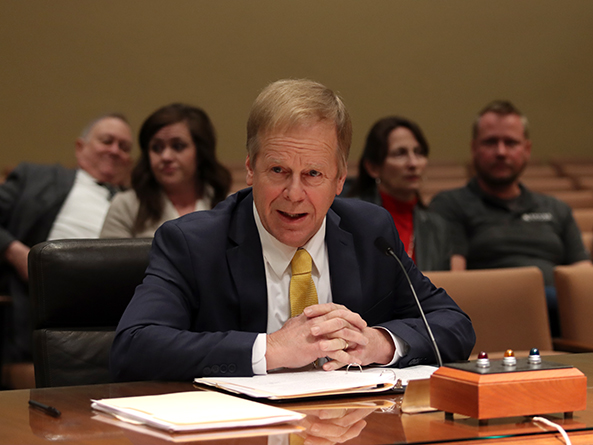Youth minimum wage considered
The Business and Labor Committee heard testimony Jan. 30 on a bill that would create a youth minimum wage and a training wage for certain new employees in Nebraska.

At the November 2022 general election, Nebraskans voted to increase the state minimum wage from $9 to $10.50 per hour on Jan. 1, 2023. The rate then increases incrementally until reaching $15 per hour on Jan. 1, 2026, and adjusts annually to account for cost of living increases.
LB15, as introduced by Albion Sen. Tom Briese, instead would set the minimum wage for employees age 14 to 17 at $9 through 2023, increasing .25 cents per year until reaching $10 per hour in 2026.
The bill also would allow employers to pay new employees who are not seasonal or migrant workers between ages 18 and 20 a minimum training wage of $9.25 through 2024, increasing to $10 per hour through 2026. Beginning Jan. 1, 2027, the training wage would be 75 percent of the otherwise applicable minimum wage.
Briese said a minimum wage carveout for youth workers is necessary to preserve and protect the financial viability of small businesses across the state. Independent businesses make up 99 percent of all employers in Nebraska, he said, many of which already are facing supply chain shortages, labor issues, fluctuating energy and transportation costs and “ever-changing” rules and regulations.
Treating urban and rural businesses the same way disproportionately hurts small and medium sized businesses, Briese said. Additionally, LB15 would encourage businesses to hire youth workers and allow them to experience the responsibility of employment, he said.
“Youth workers typically occupy entry level positions and many of our small businesses can’t afford to pay the ballot minimum for those entry level jobs,” Briese said. “It creates financial hardship on our small businesses or it forces youth labor out of the labor market — both of which are bad things.”
Briese brought an amendment to the hearing that would set both the youth and training minimum wages at $10.50 per hour, with the training wage increasing to 75 percent of the regular minimum wage beginning in 2027. He said the change would prevent an individual who currently is earning the state’s minimum wage from seeing a decrease in their pay under the bill’s provisions.
Shannon McCord, a third-generation grocery store owner from Superior, testified in support of LB15 on behalf of the Nebraska Chamber of Commerce and Industry and the Nebraska Grocery Industry Association.
Labor and energy costs and rules and regulations are driving inflation across the state, he said, making it difficult to operate a small rural business. A “one-size-fits all” mandate is a “mainstreet killer,” McCord said.
“The burden that the minimum wage increase will have on rural grocery stores fills me with fear for my small rural community,” he said.
Bud Synhorst, president and CEO of the Lincoln Independent Business Association, also spoke in support. Historically, there have been times when teenagers have earned a lower wage than more experienced workers, he said, due to the minimum wage operating as an entry-level training wage rather than as a living wage.
“I think this bill brings forward an opportunity for small business owners to come in and help young people learn the trade and different skills that are involved in these jobs,” Synhorst said.
Ken Smith, director of the Economic Justice program at Nebraska Appleseed, testified in opposition to LB15. Research shows that a higher minimum wage does not cause employers to hire fewer young workers, he said, and the bill directly contradicts the initiative petition passed by voters in 2022.
“This isn’t hammering out the details, it’s changing a policy. It’s taking a policy that our state elected — that our second house opted for — and saying that this doesn’t apply to 40,000 young workers,” Smith said. “This runs contrary to the will of the voters — the will that was clearly expressed in November.”
Felicia Hilton, representing the North Central States Regional Council of Carpenters, spoke in opposition to the bill. An individual should be paid for the work they do rather than having that wage be dependent upon their age, she said.
“Young people deserve to be paid the minimum wage increases that were passed by the ballot because of the actual labor they perform,” Hilton said.
Emma Haar, a Grand Island high school student, also testified in opposition to the bill. LB15 overlooks the reality that young people may need to work to support their families and undermines the positive economic effect of the minimum wage increase that was passed in November, she said.
“My family and I live in poverty, so I have to help my family with bills, and I’m also responsible for the costs of part of my school and extracurricular activities. I navigate a pay period like there’s a scale in my head that’s counting down the hours, money and energy I have for those two weeks,” Haar said. “This bill treats me like a child when I have the responsibilities of an adult.”
The committee took no immediate action on LB15.


